Research Proposal on University Students' Internet Resource Usage
VerifiedAdded on 2022/12/15
|13
|2621
|91
Project
AI Summary
This research proposal outlines a study on university students' internet usage for academic research and learning. It addresses the problem statement, rationale, and objectives, emphasizing the importance of internet resources in education, particularly in developing countries. The proposal includes a comprehensive literature review of internet technology and its utility, covering aspects like price, product, promotion, and accessibility. The methodology involves a survey with structured and open-ended questions, and a sample size of 100 students from a hypothetical university. The study also details the budget and project timeline. The research aims to identify current internet usage patterns, purposes, and satisfaction levels among students, as well as to understand the challenges and provide recommendations for improvement. The study seeks to understand how students perceive the internet as an academic resource and to discover the impact of internet usage on their professional knowledge and academic performance. The research is designed to provide valuable insights for educational institutions to enhance their infrastructure and promote effective internet usage among students.
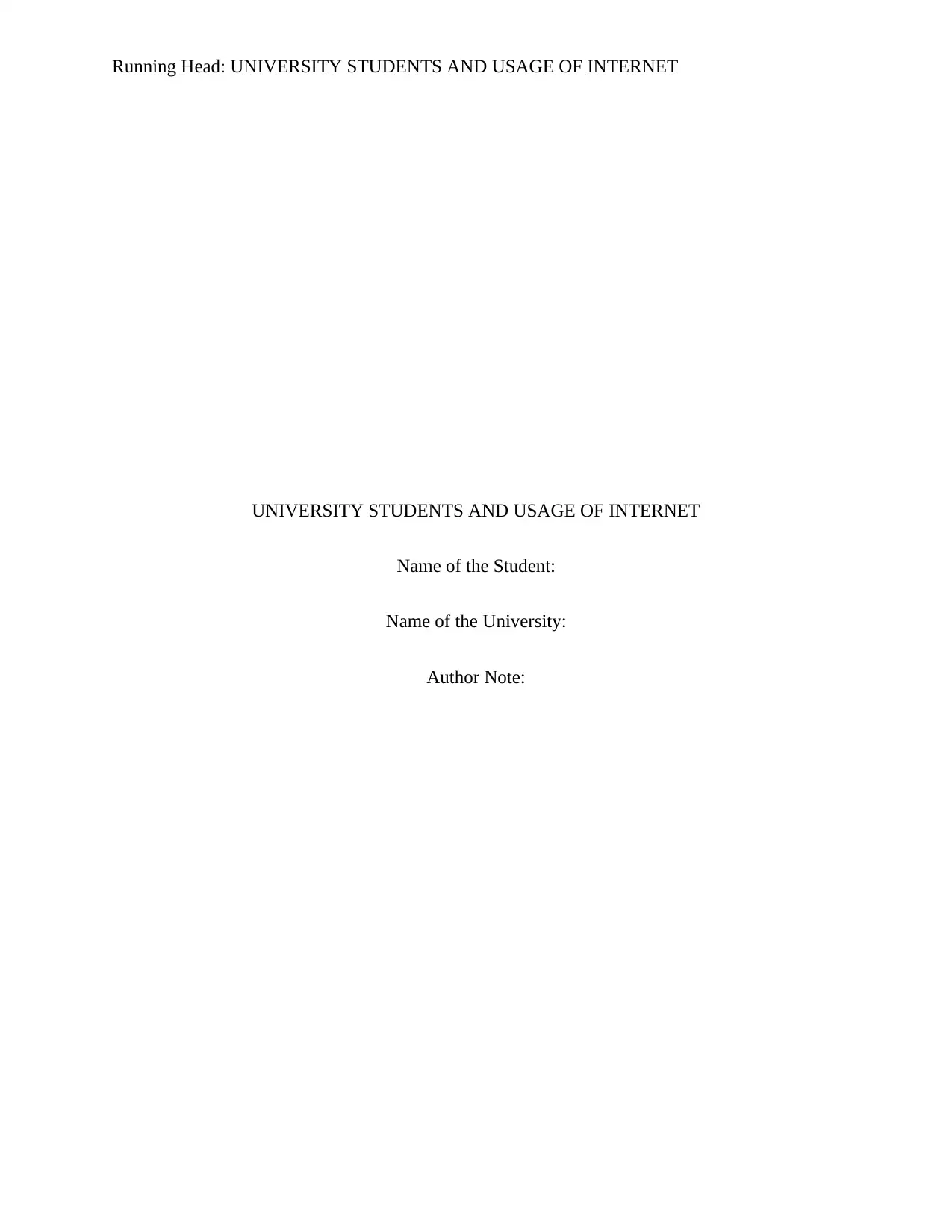
Running Head: UNIVERSITY STUDENTS AND USAGE OF INTERNET
UNIVERSITY STUDENTS AND USAGE OF INTERNET
Name of the Student:
Name of the University:
Author Note:
UNIVERSITY STUDENTS AND USAGE OF INTERNET
Name of the Student:
Name of the University:
Author Note:
Paraphrase This Document
Need a fresh take? Get an instant paraphrase of this document with our AI Paraphraser
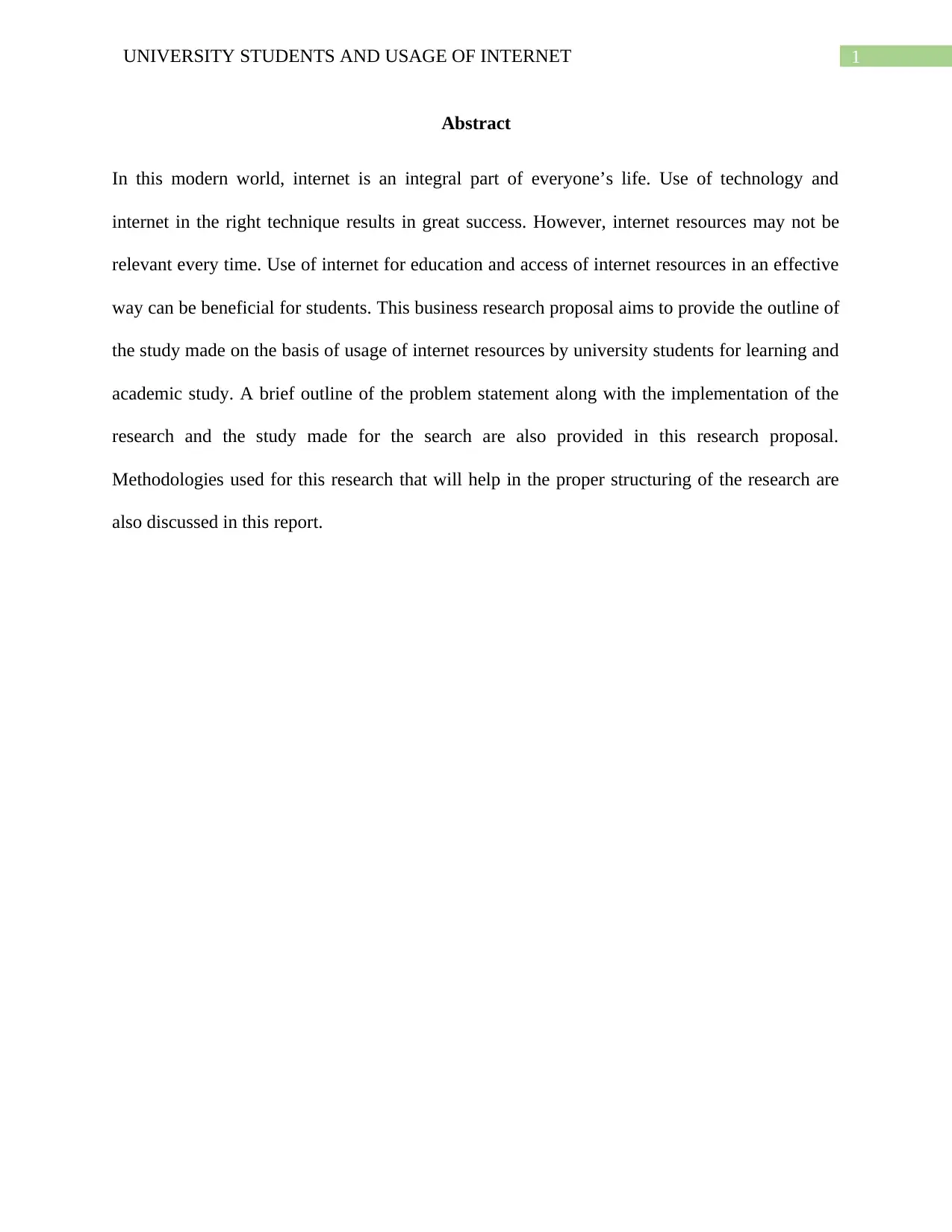
1UNIVERSITY STUDENTS AND USAGE OF INTERNET
Abstract
In this modern world, internet is an integral part of everyone’s life. Use of technology and
internet in the right technique results in great success. However, internet resources may not be
relevant every time. Use of internet for education and access of internet resources in an effective
way can be beneficial for students. This business research proposal aims to provide the outline of
the study made on the basis of usage of internet resources by university students for learning and
academic study. A brief outline of the problem statement along with the implementation of the
research and the study made for the search are also provided in this research proposal.
Methodologies used for this research that will help in the proper structuring of the research are
also discussed in this report.
Abstract
In this modern world, internet is an integral part of everyone’s life. Use of technology and
internet in the right technique results in great success. However, internet resources may not be
relevant every time. Use of internet for education and access of internet resources in an effective
way can be beneficial for students. This business research proposal aims to provide the outline of
the study made on the basis of usage of internet resources by university students for learning and
academic study. A brief outline of the problem statement along with the implementation of the
research and the study made for the search are also provided in this research proposal.
Methodologies used for this research that will help in the proper structuring of the research are
also discussed in this report.
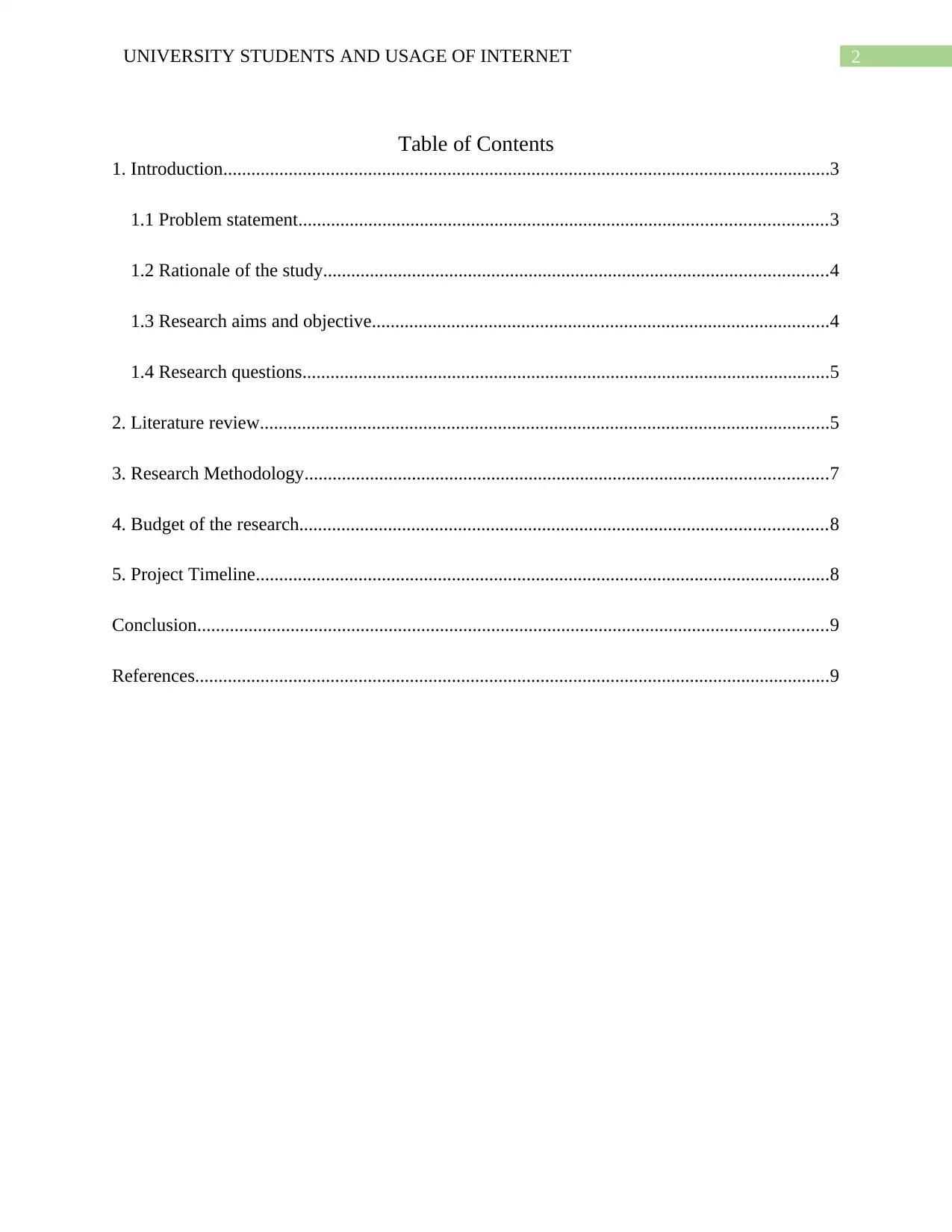
2UNIVERSITY STUDENTS AND USAGE OF INTERNET
Table of Contents
1. Introduction..................................................................................................................................3
1.1 Problem statement.................................................................................................................3
1.2 Rationale of the study............................................................................................................4
1.3 Research aims and objective..................................................................................................4
1.4 Research questions.................................................................................................................5
2. Literature review..........................................................................................................................5
3. Research Methodology................................................................................................................7
4. Budget of the research.................................................................................................................8
5. Project Timeline...........................................................................................................................8
Conclusion.......................................................................................................................................9
References........................................................................................................................................9
Table of Contents
1. Introduction..................................................................................................................................3
1.1 Problem statement.................................................................................................................3
1.2 Rationale of the study............................................................................................................4
1.3 Research aims and objective..................................................................................................4
1.4 Research questions.................................................................................................................5
2. Literature review..........................................................................................................................5
3. Research Methodology................................................................................................................7
4. Budget of the research.................................................................................................................8
5. Project Timeline...........................................................................................................................8
Conclusion.......................................................................................................................................9
References........................................................................................................................................9
⊘ This is a preview!⊘
Do you want full access?
Subscribe today to unlock all pages.

Trusted by 1+ million students worldwide
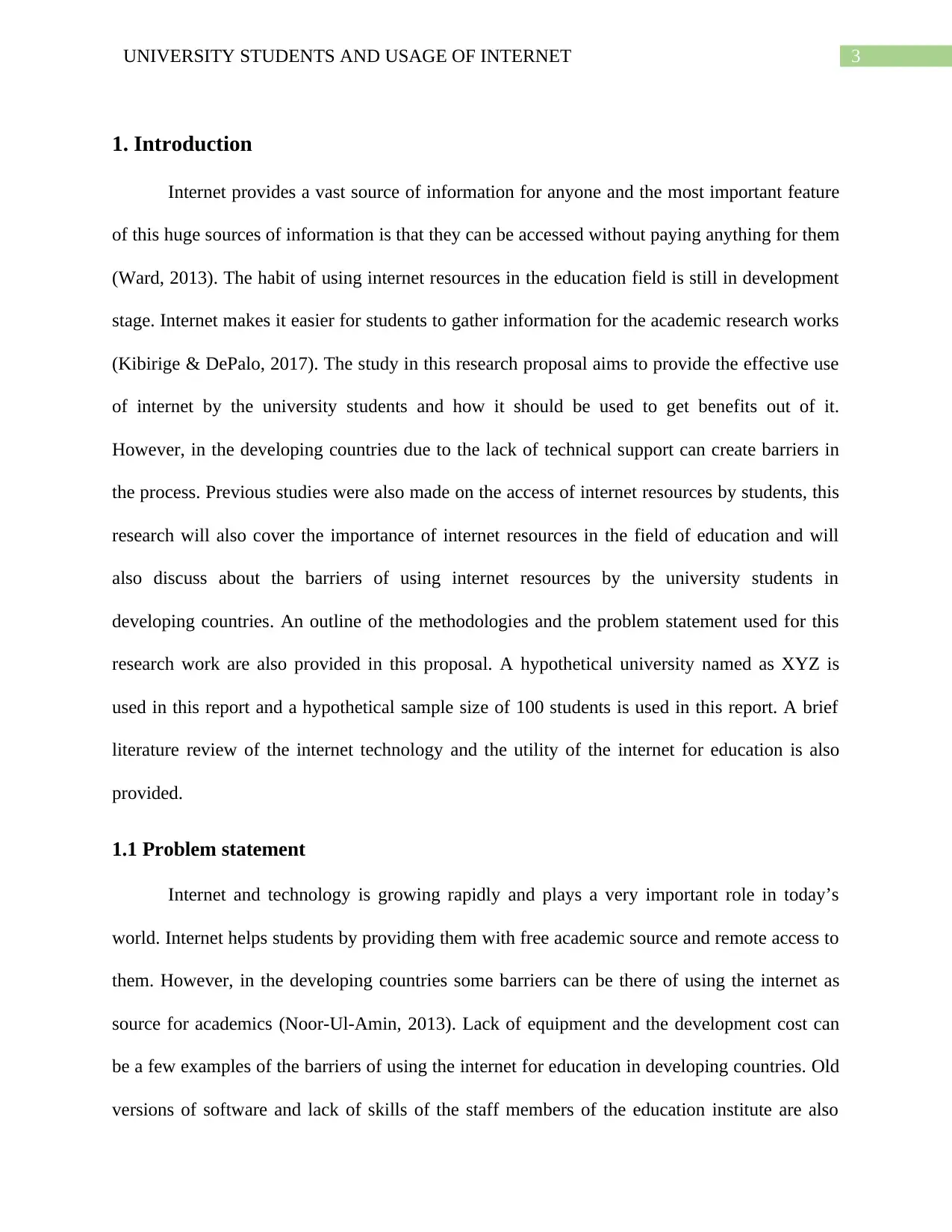
3UNIVERSITY STUDENTS AND USAGE OF INTERNET
1. Introduction
Internet provides a vast source of information for anyone and the most important feature
of this huge sources of information is that they can be accessed without paying anything for them
(Ward, 2013). The habit of using internet resources in the education field is still in development
stage. Internet makes it easier for students to gather information for the academic research works
(Kibirige & DePalo, 2017). The study in this research proposal aims to provide the effective use
of internet by the university students and how it should be used to get benefits out of it.
However, in the developing countries due to the lack of technical support can create barriers in
the process. Previous studies were also made on the access of internet resources by students, this
research will also cover the importance of internet resources in the field of education and will
also discuss about the barriers of using internet resources by the university students in
developing countries. An outline of the methodologies and the problem statement used for this
research work are also provided in this proposal. A hypothetical university named as XYZ is
used in this report and a hypothetical sample size of 100 students is used in this report. A brief
literature review of the internet technology and the utility of the internet for education is also
provided.
1.1 Problem statement
Internet and technology is growing rapidly and plays a very important role in today’s
world. Internet helps students by providing them with free academic source and remote access to
them. However, in the developing countries some barriers can be there of using the internet as
source for academics (Noor-Ul-Amin, 2013). Lack of equipment and the development cost can
be a few examples of the barriers of using the internet for education in developing countries. Old
versions of software and lack of skills of the staff members of the education institute are also
1. Introduction
Internet provides a vast source of information for anyone and the most important feature
of this huge sources of information is that they can be accessed without paying anything for them
(Ward, 2013). The habit of using internet resources in the education field is still in development
stage. Internet makes it easier for students to gather information for the academic research works
(Kibirige & DePalo, 2017). The study in this research proposal aims to provide the effective use
of internet by the university students and how it should be used to get benefits out of it.
However, in the developing countries due to the lack of technical support can create barriers in
the process. Previous studies were also made on the access of internet resources by students, this
research will also cover the importance of internet resources in the field of education and will
also discuss about the barriers of using internet resources by the university students in
developing countries. An outline of the methodologies and the problem statement used for this
research work are also provided in this proposal. A hypothetical university named as XYZ is
used in this report and a hypothetical sample size of 100 students is used in this report. A brief
literature review of the internet technology and the utility of the internet for education is also
provided.
1.1 Problem statement
Internet and technology is growing rapidly and plays a very important role in today’s
world. Internet helps students by providing them with free academic source and remote access to
them. However, in the developing countries some barriers can be there of using the internet as
source for academics (Noor-Ul-Amin, 2013). Lack of equipment and the development cost can
be a few examples of the barriers of using the internet for education in developing countries. Old
versions of software and lack of skills of the staff members of the education institute are also
Paraphrase This Document
Need a fresh take? Get an instant paraphrase of this document with our AI Paraphraser
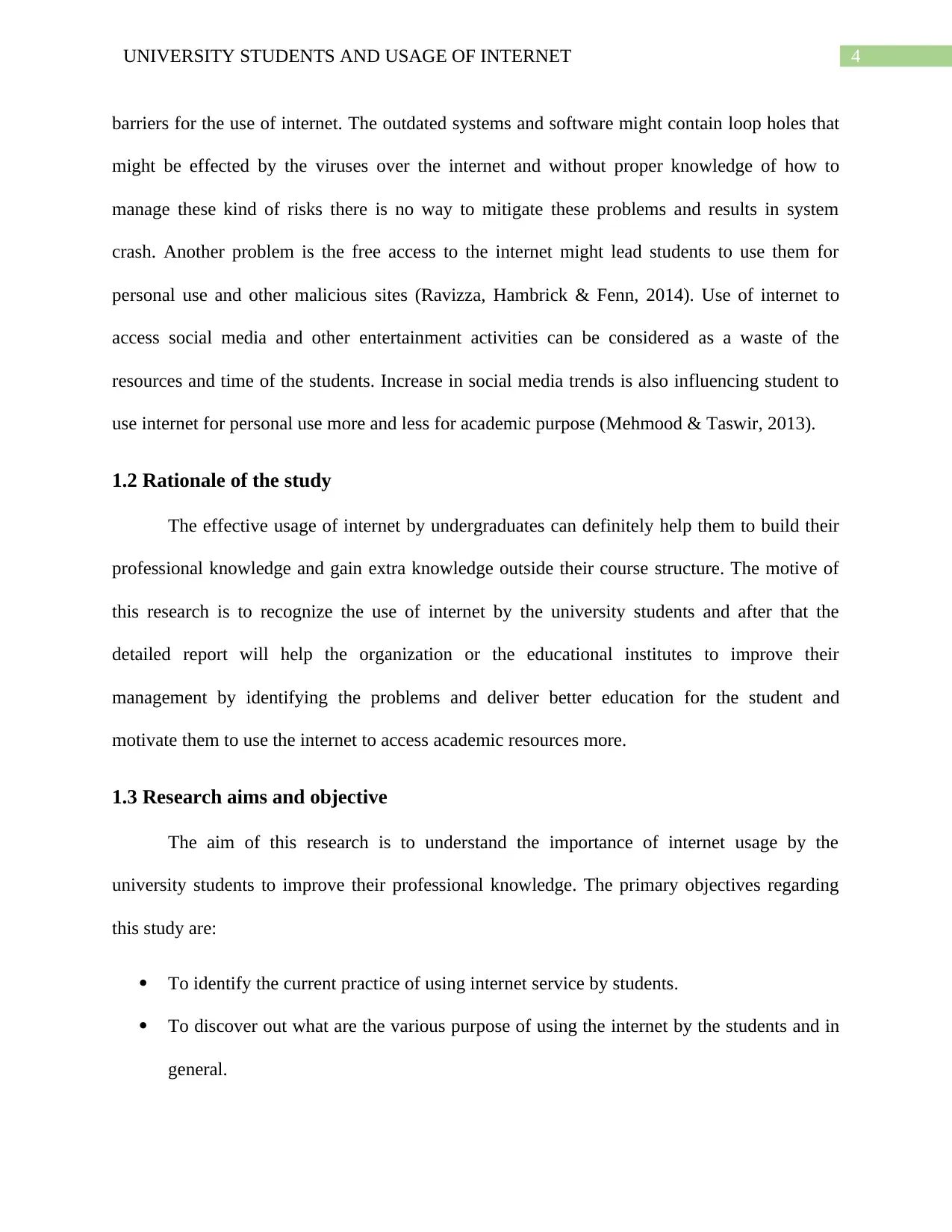
4UNIVERSITY STUDENTS AND USAGE OF INTERNET
barriers for the use of internet. The outdated systems and software might contain loop holes that
might be effected by the viruses over the internet and without proper knowledge of how to
manage these kind of risks there is no way to mitigate these problems and results in system
crash. Another problem is the free access to the internet might lead students to use them for
personal use and other malicious sites (Ravizza, Hambrick & Fenn, 2014). Use of internet to
access social media and other entertainment activities can be considered as a waste of the
resources and time of the students. Increase in social media trends is also influencing student to
use internet for personal use more and less for academic purpose (Mehmood & Taswir, 2013).
1.2 Rationale of the study
The effective usage of internet by undergraduates can definitely help them to build their
professional knowledge and gain extra knowledge outside their course structure. The motive of
this research is to recognize the use of internet by the university students and after that the
detailed report will help the organization or the educational institutes to improve their
management by identifying the problems and deliver better education for the student and
motivate them to use the internet to access academic resources more.
1.3 Research aims and objective
The aim of this research is to understand the importance of internet usage by the
university students to improve their professional knowledge. The primary objectives regarding
this study are:
To identify the current practice of using internet service by students.
To discover out what are the various purpose of using the internet by the students and in
general.
barriers for the use of internet. The outdated systems and software might contain loop holes that
might be effected by the viruses over the internet and without proper knowledge of how to
manage these kind of risks there is no way to mitigate these problems and results in system
crash. Another problem is the free access to the internet might lead students to use them for
personal use and other malicious sites (Ravizza, Hambrick & Fenn, 2014). Use of internet to
access social media and other entertainment activities can be considered as a waste of the
resources and time of the students. Increase in social media trends is also influencing student to
use internet for personal use more and less for academic purpose (Mehmood & Taswir, 2013).
1.2 Rationale of the study
The effective usage of internet by undergraduates can definitely help them to build their
professional knowledge and gain extra knowledge outside their course structure. The motive of
this research is to recognize the use of internet by the university students and after that the
detailed report will help the organization or the educational institutes to improve their
management by identifying the problems and deliver better education for the student and
motivate them to use the internet to access academic resources more.
1.3 Research aims and objective
The aim of this research is to understand the importance of internet usage by the
university students to improve their professional knowledge. The primary objectives regarding
this study are:
To identify the current practice of using internet service by students.
To discover out what are the various purpose of using the internet by the students and in
general.
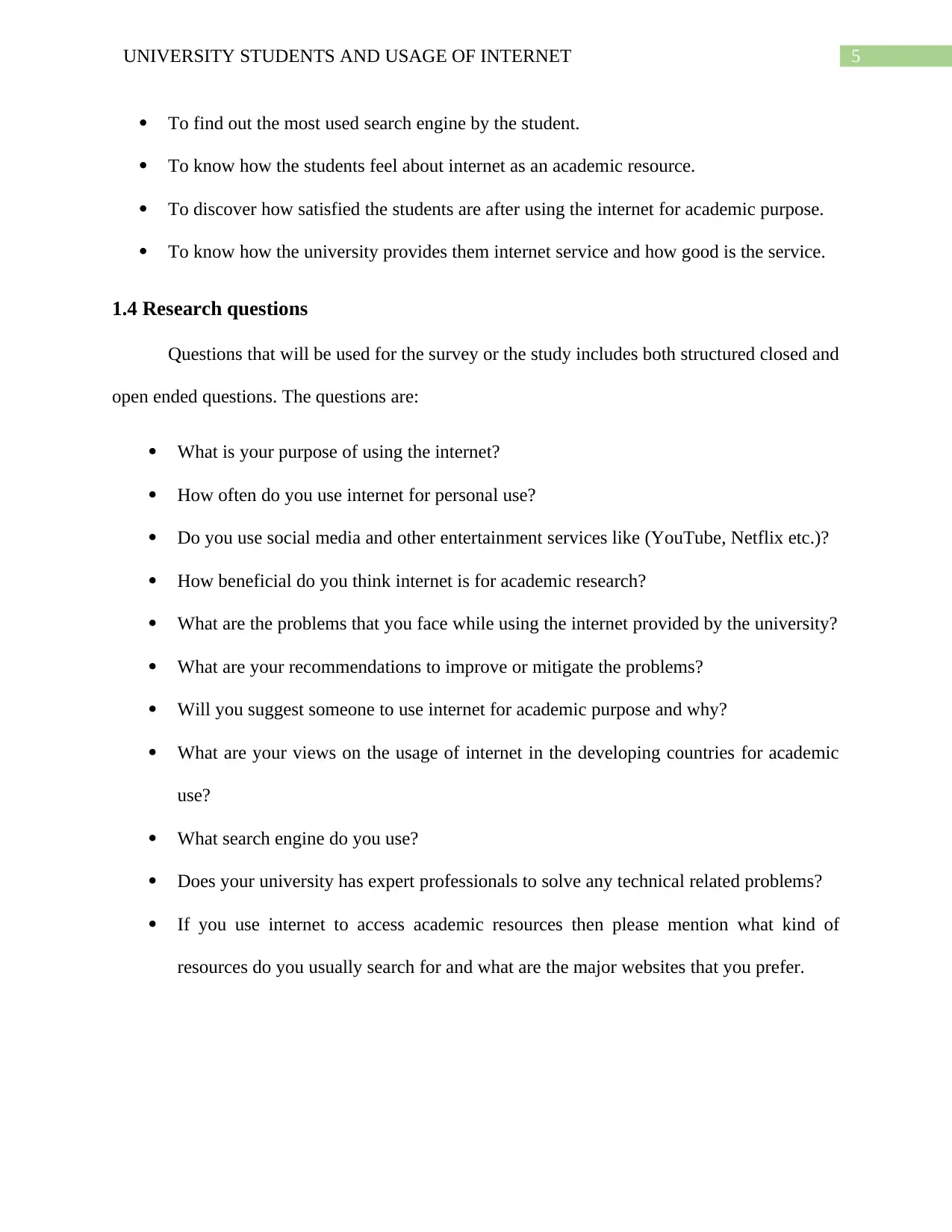
5UNIVERSITY STUDENTS AND USAGE OF INTERNET
To find out the most used search engine by the student.
To know how the students feel about internet as an academic resource.
To discover how satisfied the students are after using the internet for academic purpose.
To know how the university provides them internet service and how good is the service.
1.4 Research questions
Questions that will be used for the survey or the study includes both structured closed and
open ended questions. The questions are:
What is your purpose of using the internet?
How often do you use internet for personal use?
Do you use social media and other entertainment services like (YouTube, Netflix etc.)?
How beneficial do you think internet is for academic research?
What are the problems that you face while using the internet provided by the university?
What are your recommendations to improve or mitigate the problems?
Will you suggest someone to use internet for academic purpose and why?
What are your views on the usage of internet in the developing countries for academic
use?
What search engine do you use?
Does your university has expert professionals to solve any technical related problems?
If you use internet to access academic resources then please mention what kind of
resources do you usually search for and what are the major websites that you prefer.
To find out the most used search engine by the student.
To know how the students feel about internet as an academic resource.
To discover how satisfied the students are after using the internet for academic purpose.
To know how the university provides them internet service and how good is the service.
1.4 Research questions
Questions that will be used for the survey or the study includes both structured closed and
open ended questions. The questions are:
What is your purpose of using the internet?
How often do you use internet for personal use?
Do you use social media and other entertainment services like (YouTube, Netflix etc.)?
How beneficial do you think internet is for academic research?
What are the problems that you face while using the internet provided by the university?
What are your recommendations to improve or mitigate the problems?
Will you suggest someone to use internet for academic purpose and why?
What are your views on the usage of internet in the developing countries for academic
use?
What search engine do you use?
Does your university has expert professionals to solve any technical related problems?
If you use internet to access academic resources then please mention what kind of
resources do you usually search for and what are the major websites that you prefer.
⊘ This is a preview!⊘
Do you want full access?
Subscribe today to unlock all pages.

Trusted by 1+ million students worldwide
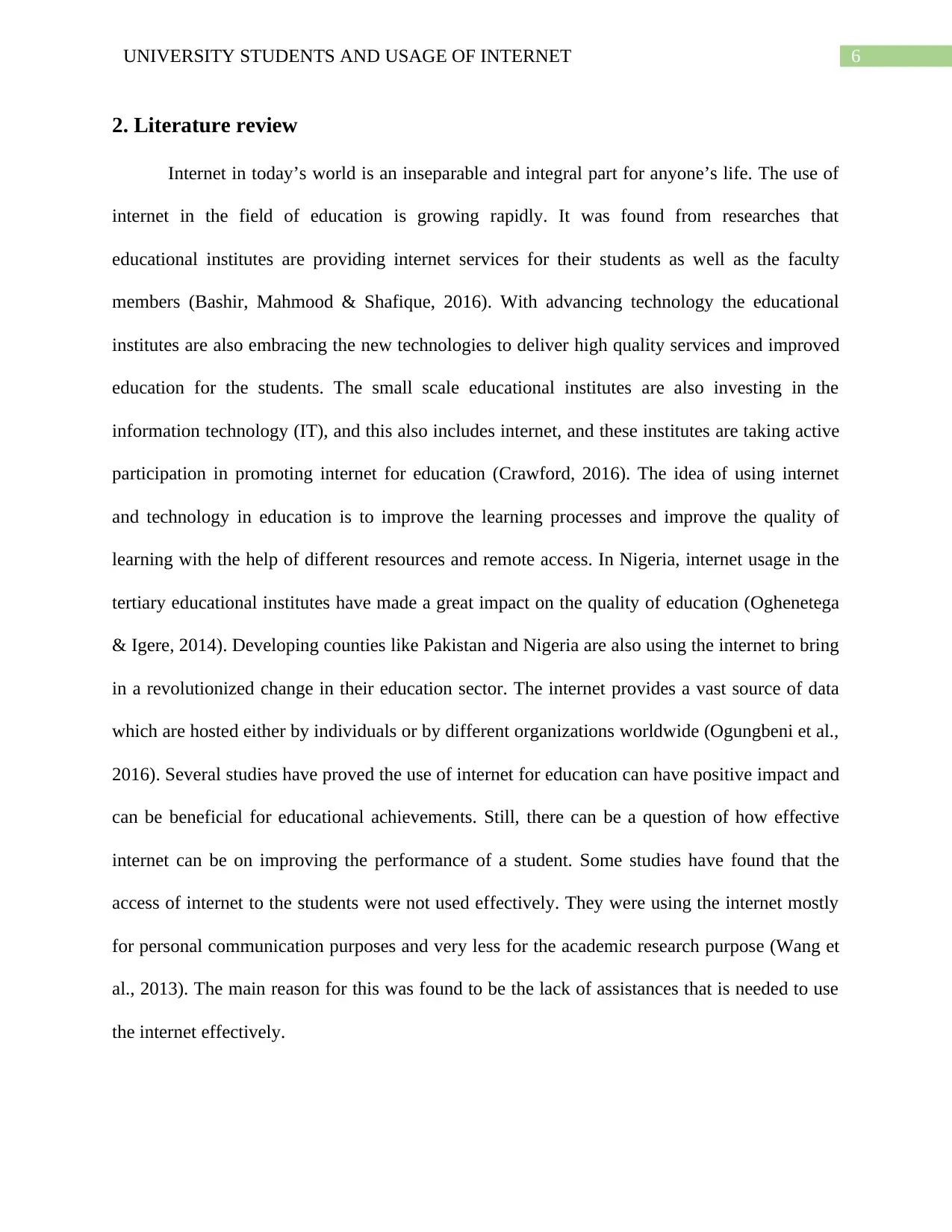
6UNIVERSITY STUDENTS AND USAGE OF INTERNET
2. Literature review
Internet in today’s world is an inseparable and integral part for anyone’s life. The use of
internet in the field of education is growing rapidly. It was found from researches that
educational institutes are providing internet services for their students as well as the faculty
members (Bashir, Mahmood & Shafique, 2016). With advancing technology the educational
institutes are also embracing the new technologies to deliver high quality services and improved
education for the students. The small scale educational institutes are also investing in the
information technology (IT), and this also includes internet, and these institutes are taking active
participation in promoting internet for education (Crawford, 2016). The idea of using internet
and technology in education is to improve the learning processes and improve the quality of
learning with the help of different resources and remote access. In Nigeria, internet usage in the
tertiary educational institutes have made a great impact on the quality of education (Oghenetega
& Igere, 2014). Developing counties like Pakistan and Nigeria are also using the internet to bring
in a revolutionized change in their education sector. The internet provides a vast source of data
which are hosted either by individuals or by different organizations worldwide (Ogungbeni et al.,
2016). Several studies have proved the use of internet for education can have positive impact and
can be beneficial for educational achievements. Still, there can be a question of how effective
internet can be on improving the performance of a student. Some studies have found that the
access of internet to the students were not used effectively. They were using the internet mostly
for personal communication purposes and very less for the academic research purpose (Wang et
al., 2013). The main reason for this was found to be the lack of assistances that is needed to use
the internet effectively.
2. Literature review
Internet in today’s world is an inseparable and integral part for anyone’s life. The use of
internet in the field of education is growing rapidly. It was found from researches that
educational institutes are providing internet services for their students as well as the faculty
members (Bashir, Mahmood & Shafique, 2016). With advancing technology the educational
institutes are also embracing the new technologies to deliver high quality services and improved
education for the students. The small scale educational institutes are also investing in the
information technology (IT), and this also includes internet, and these institutes are taking active
participation in promoting internet for education (Crawford, 2016). The idea of using internet
and technology in education is to improve the learning processes and improve the quality of
learning with the help of different resources and remote access. In Nigeria, internet usage in the
tertiary educational institutes have made a great impact on the quality of education (Oghenetega
& Igere, 2014). Developing counties like Pakistan and Nigeria are also using the internet to bring
in a revolutionized change in their education sector. The internet provides a vast source of data
which are hosted either by individuals or by different organizations worldwide (Ogungbeni et al.,
2016). Several studies have proved the use of internet for education can have positive impact and
can be beneficial for educational achievements. Still, there can be a question of how effective
internet can be on improving the performance of a student. Some studies have found that the
access of internet to the students were not used effectively. They were using the internet mostly
for personal communication purposes and very less for the academic research purpose (Wang et
al., 2013). The main reason for this was found to be the lack of assistances that is needed to use
the internet effectively.
Paraphrase This Document
Need a fresh take? Get an instant paraphrase of this document with our AI Paraphraser
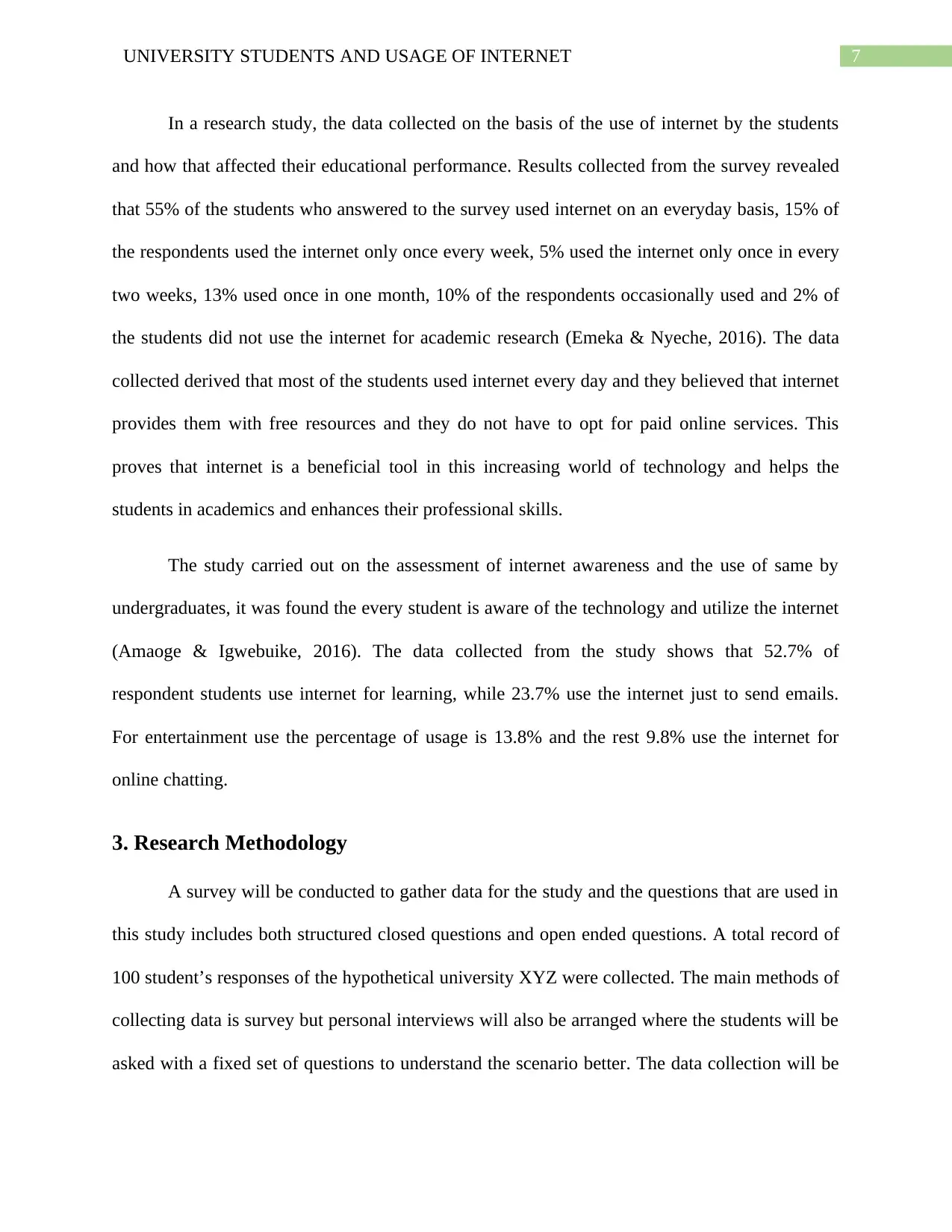
7UNIVERSITY STUDENTS AND USAGE OF INTERNET
In a research study, the data collected on the basis of the use of internet by the students
and how that affected their educational performance. Results collected from the survey revealed
that 55% of the students who answered to the survey used internet on an everyday basis, 15% of
the respondents used the internet only once every week, 5% used the internet only once in every
two weeks, 13% used once in one month, 10% of the respondents occasionally used and 2% of
the students did not use the internet for academic research (Emeka & Nyeche, 2016). The data
collected derived that most of the students used internet every day and they believed that internet
provides them with free resources and they do not have to opt for paid online services. This
proves that internet is a beneficial tool in this increasing world of technology and helps the
students in academics and enhances their professional skills.
The study carried out on the assessment of internet awareness and the use of same by
undergraduates, it was found the every student is aware of the technology and utilize the internet
(Amaoge & Igwebuike, 2016). The data collected from the study shows that 52.7% of
respondent students use internet for learning, while 23.7% use the internet just to send emails.
For entertainment use the percentage of usage is 13.8% and the rest 9.8% use the internet for
online chatting.
3. Research Methodology
A survey will be conducted to gather data for the study and the questions that are used in
this study includes both structured closed questions and open ended questions. A total record of
100 student’s responses of the hypothetical university XYZ were collected. The main methods of
collecting data is survey but personal interviews will also be arranged where the students will be
asked with a fixed set of questions to understand the scenario better. The data collection will be
In a research study, the data collected on the basis of the use of internet by the students
and how that affected their educational performance. Results collected from the survey revealed
that 55% of the students who answered to the survey used internet on an everyday basis, 15% of
the respondents used the internet only once every week, 5% used the internet only once in every
two weeks, 13% used once in one month, 10% of the respondents occasionally used and 2% of
the students did not use the internet for academic research (Emeka & Nyeche, 2016). The data
collected derived that most of the students used internet every day and they believed that internet
provides them with free resources and they do not have to opt for paid online services. This
proves that internet is a beneficial tool in this increasing world of technology and helps the
students in academics and enhances their professional skills.
The study carried out on the assessment of internet awareness and the use of same by
undergraduates, it was found the every student is aware of the technology and utilize the internet
(Amaoge & Igwebuike, 2016). The data collected from the study shows that 52.7% of
respondent students use internet for learning, while 23.7% use the internet just to send emails.
For entertainment use the percentage of usage is 13.8% and the rest 9.8% use the internet for
online chatting.
3. Research Methodology
A survey will be conducted to gather data for the study and the questions that are used in
this study includes both structured closed questions and open ended questions. A total record of
100 student’s responses of the hypothetical university XYZ were collected. The main methods of
collecting data is survey but personal interviews will also be arranged where the students will be
asked with a fixed set of questions to understand the scenario better. The data collection will be
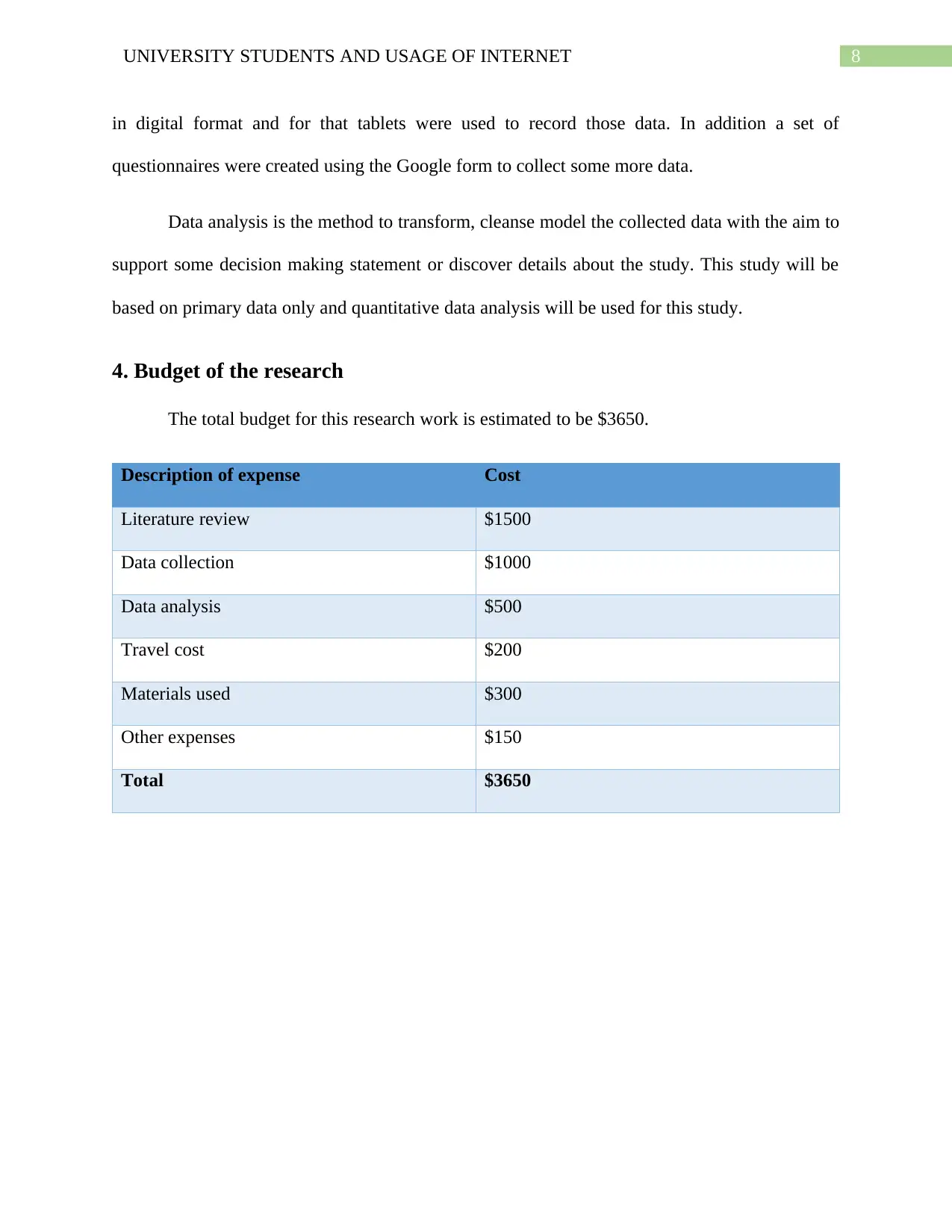
8UNIVERSITY STUDENTS AND USAGE OF INTERNET
in digital format and for that tablets were used to record those data. In addition a set of
questionnaires were created using the Google form to collect some more data.
Data analysis is the method to transform, cleanse model the collected data with the aim to
support some decision making statement or discover details about the study. This study will be
based on primary data only and quantitative data analysis will be used for this study.
4. Budget of the research
The total budget for this research work is estimated to be $3650.
Description of expense Cost
Literature review $1500
Data collection $1000
Data analysis $500
Travel cost $200
Materials used $300
Other expenses $150
Total $3650
in digital format and for that tablets were used to record those data. In addition a set of
questionnaires were created using the Google form to collect some more data.
Data analysis is the method to transform, cleanse model the collected data with the aim to
support some decision making statement or discover details about the study. This study will be
based on primary data only and quantitative data analysis will be used for this study.
4. Budget of the research
The total budget for this research work is estimated to be $3650.
Description of expense Cost
Literature review $1500
Data collection $1000
Data analysis $500
Travel cost $200
Materials used $300
Other expenses $150
Total $3650
⊘ This is a preview!⊘
Do you want full access?
Subscribe today to unlock all pages.

Trusted by 1+ million students worldwide
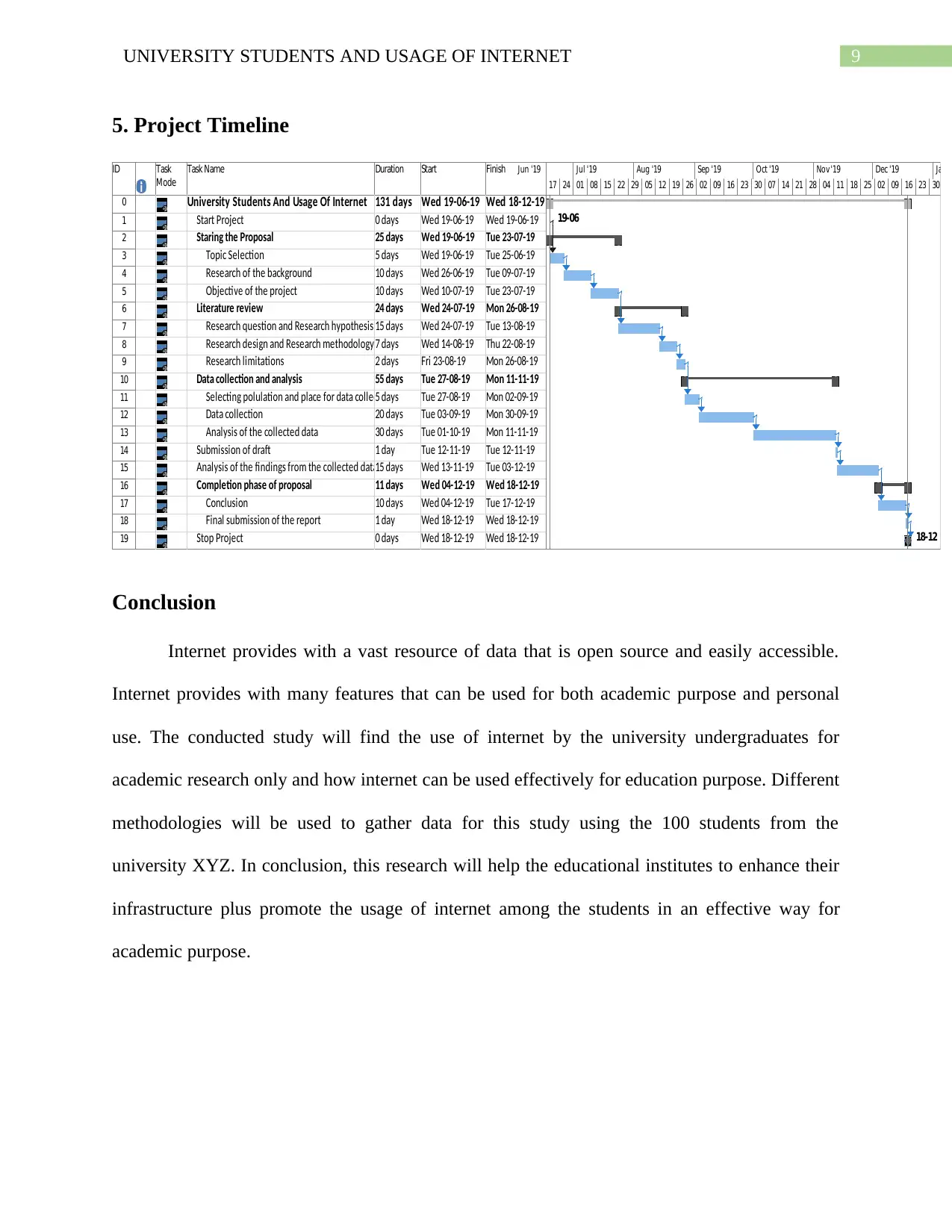
9UNIVERSITY STUDENTS AND USAGE OF INTERNET
5. Project Timeline
ID Task
Mode
Task Name Duration Start Finish
0 University Students And Usage Of Internet 131 days Wed 19-06-19 Wed 18-12-19
1 Start Project 0 days Wed 19-06-19 Wed 19-06-19
2 Staring the Proposal 25 days Wed 19-06-19 Tue 23-07-19
3 Topic Selection 5 days Wed 19-06-19 Tue 25-06-19
4 Research of the background 10 days Wed 26-06-19 Tue 09-07-19
5 Objective of the project 10 days Wed 10-07-19 Tue 23-07-19
6 Literature review 24 days Wed 24-07-19 Mon 26-08-19
7 Research question and Research hypothesis 15 days Wed 24-07-19 Tue 13-08-19
8 Research design and Research methodology 7 days Wed 14-08-19 Thu 22-08-19
9 Research limitations 2 days Fri 23-08-19 Mon 26-08-19
10 Data collection and analysis 55 days Tue 27-08-19 Mon 11-11-19
11 Selecting polulation and place for data collection5 days Tue 27-08-19 Mon 02-09-19
12 Data collection 20 days Tue 03-09-19 Mon 30-09-19
13 Analysis of the collected data 30 days Tue 01-10-19 Mon 11-11-19
14 Submission of draft 1 day Tue 12-11-19 Tue 12-11-19
15 Analysis of the findings from the collected data15 days Wed 13-11-19 Tue 03-12-19
16 Completion phase of proposal 11 days Wed 04-12-19 Wed 18-12-19
17 Conclusion 10 days Wed 04-12-19 Tue 17-12-19
18 Final submission of the report 1 day Wed 18-12-19 Wed 18-12-19
19 Stop Project 0 days Wed 18-12-19 Wed 18-12-19
19-06
18-12
17 24 01 08 15 22 29 05 12 19 26 02 09 16 23 30 07 14 21 28 04 11 18 25 02 09 16 23 30
Jun '19 Jul '19 Aug '19 Sep '19 Oct '19 Nov '19 Dec '19 Jan '2
Conclusion
Internet provides with a vast resource of data that is open source and easily accessible.
Internet provides with many features that can be used for both academic purpose and personal
use. The conducted study will find the use of internet by the university undergraduates for
academic research only and how internet can be used effectively for education purpose. Different
methodologies will be used to gather data for this study using the 100 students from the
university XYZ. In conclusion, this research will help the educational institutes to enhance their
infrastructure plus promote the usage of internet among the students in an effective way for
academic purpose.
5. Project Timeline
ID Task
Mode
Task Name Duration Start Finish
0 University Students And Usage Of Internet 131 days Wed 19-06-19 Wed 18-12-19
1 Start Project 0 days Wed 19-06-19 Wed 19-06-19
2 Staring the Proposal 25 days Wed 19-06-19 Tue 23-07-19
3 Topic Selection 5 days Wed 19-06-19 Tue 25-06-19
4 Research of the background 10 days Wed 26-06-19 Tue 09-07-19
5 Objective of the project 10 days Wed 10-07-19 Tue 23-07-19
6 Literature review 24 days Wed 24-07-19 Mon 26-08-19
7 Research question and Research hypothesis 15 days Wed 24-07-19 Tue 13-08-19
8 Research design and Research methodology 7 days Wed 14-08-19 Thu 22-08-19
9 Research limitations 2 days Fri 23-08-19 Mon 26-08-19
10 Data collection and analysis 55 days Tue 27-08-19 Mon 11-11-19
11 Selecting polulation and place for data collection5 days Tue 27-08-19 Mon 02-09-19
12 Data collection 20 days Tue 03-09-19 Mon 30-09-19
13 Analysis of the collected data 30 days Tue 01-10-19 Mon 11-11-19
14 Submission of draft 1 day Tue 12-11-19 Tue 12-11-19
15 Analysis of the findings from the collected data15 days Wed 13-11-19 Tue 03-12-19
16 Completion phase of proposal 11 days Wed 04-12-19 Wed 18-12-19
17 Conclusion 10 days Wed 04-12-19 Tue 17-12-19
18 Final submission of the report 1 day Wed 18-12-19 Wed 18-12-19
19 Stop Project 0 days Wed 18-12-19 Wed 18-12-19
19-06
18-12
17 24 01 08 15 22 29 05 12 19 26 02 09 16 23 30 07 14 21 28 04 11 18 25 02 09 16 23 30
Jun '19 Jul '19 Aug '19 Sep '19 Oct '19 Nov '19 Dec '19 Jan '2
Conclusion
Internet provides with a vast resource of data that is open source and easily accessible.
Internet provides with many features that can be used for both academic purpose and personal
use. The conducted study will find the use of internet by the university undergraduates for
academic research only and how internet can be used effectively for education purpose. Different
methodologies will be used to gather data for this study using the 100 students from the
university XYZ. In conclusion, this research will help the educational institutes to enhance their
infrastructure plus promote the usage of internet among the students in an effective way for
academic purpose.
Paraphrase This Document
Need a fresh take? Get an instant paraphrase of this document with our AI Paraphraser
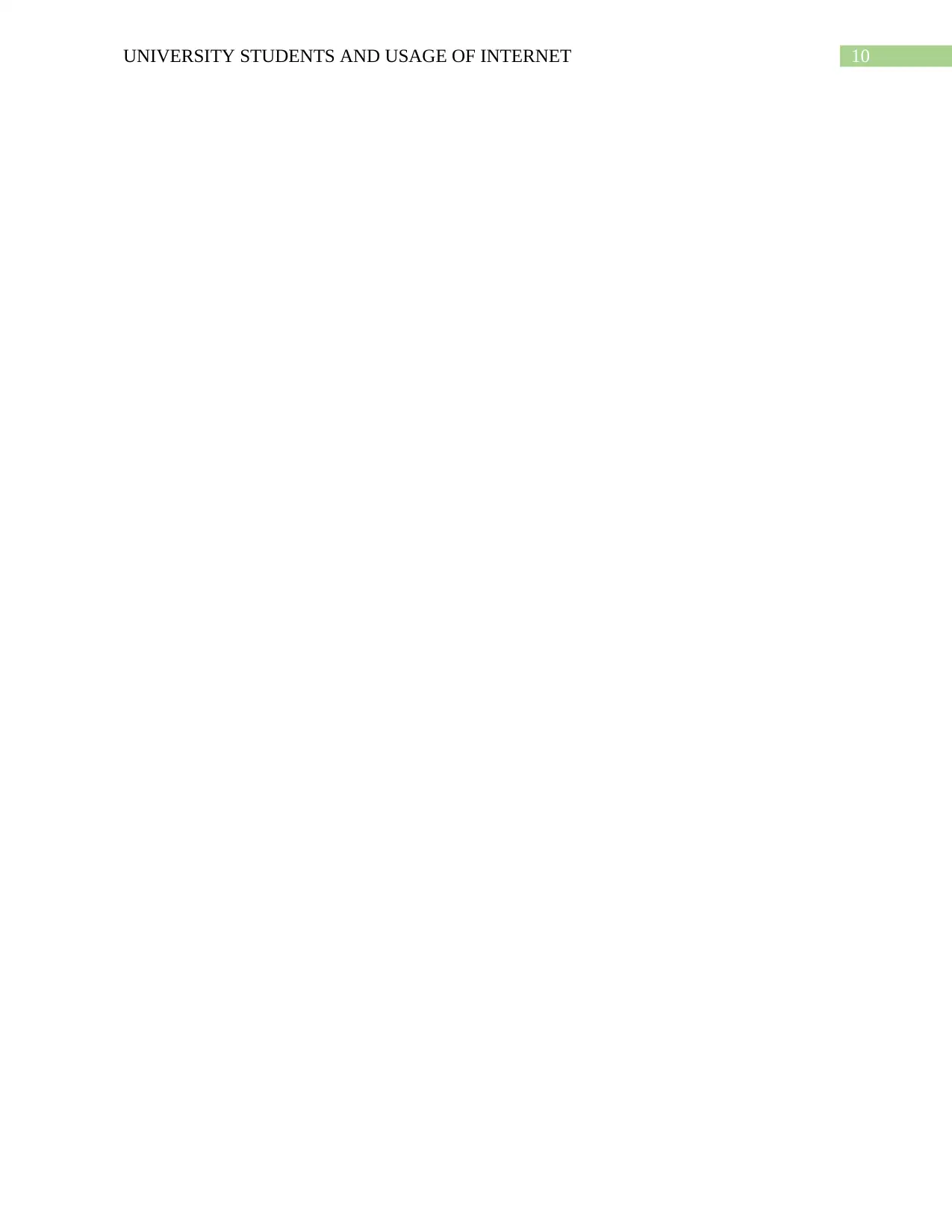
10UNIVERSITY STUDENTS AND USAGE OF INTERNET
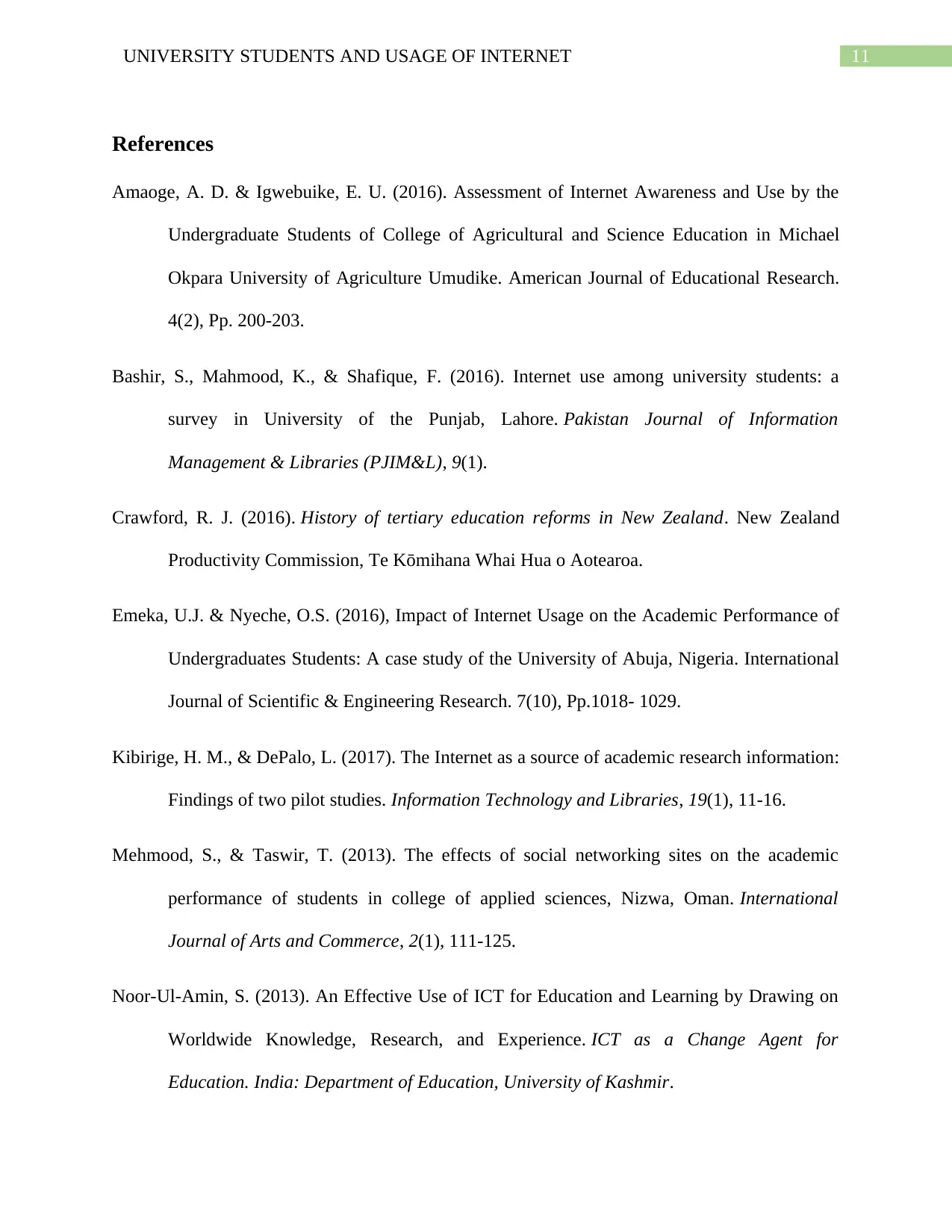
11UNIVERSITY STUDENTS AND USAGE OF INTERNET
References
Amaoge, A. D. & Igwebuike, E. U. (2016). Assessment of Internet Awareness and Use by the
Undergraduate Students of College of Agricultural and Science Education in Michael
Okpara University of Agriculture Umudike. American Journal of Educational Research.
4(2), Pp. 200-203.
Bashir, S., Mahmood, K., & Shafique, F. (2016). Internet use among university students: a
survey in University of the Punjab, Lahore. Pakistan Journal of Information
Management & Libraries (PJIM&L), 9(1).
Crawford, R. J. (2016). History of tertiary education reforms in New Zealand. New Zealand
Productivity Commission, Te Kōmihana Whai Hua o Aotearoa.
Emeka, U.J. & Nyeche, O.S. (2016), Impact of Internet Usage on the Academic Performance of
Undergraduates Students: A case study of the University of Abuja, Nigeria. International
Journal of Scientific & Engineering Research. 7(10), Pp.1018- 1029.
Kibirige, H. M., & DePalo, L. (2017). The Internet as a source of academic research information:
Findings of two pilot studies. Information Technology and Libraries, 19(1), 11-16.
Mehmood, S., & Taswir, T. (2013). The effects of social networking sites on the academic
performance of students in college of applied sciences, Nizwa, Oman. International
Journal of Arts and Commerce, 2(1), 111-125.
Noor-Ul-Amin, S. (2013). An Effective Use of ICT for Education and Learning by Drawing on
Worldwide Knowledge, Research, and Experience. ICT as a Change Agent for
Education. India: Department of Education, University of Kashmir.
References
Amaoge, A. D. & Igwebuike, E. U. (2016). Assessment of Internet Awareness and Use by the
Undergraduate Students of College of Agricultural and Science Education in Michael
Okpara University of Agriculture Umudike. American Journal of Educational Research.
4(2), Pp. 200-203.
Bashir, S., Mahmood, K., & Shafique, F. (2016). Internet use among university students: a
survey in University of the Punjab, Lahore. Pakistan Journal of Information
Management & Libraries (PJIM&L), 9(1).
Crawford, R. J. (2016). History of tertiary education reforms in New Zealand. New Zealand
Productivity Commission, Te Kōmihana Whai Hua o Aotearoa.
Emeka, U.J. & Nyeche, O.S. (2016), Impact of Internet Usage on the Academic Performance of
Undergraduates Students: A case study of the University of Abuja, Nigeria. International
Journal of Scientific & Engineering Research. 7(10), Pp.1018- 1029.
Kibirige, H. M., & DePalo, L. (2017). The Internet as a source of academic research information:
Findings of two pilot studies. Information Technology and Libraries, 19(1), 11-16.
Mehmood, S., & Taswir, T. (2013). The effects of social networking sites on the academic
performance of students in college of applied sciences, Nizwa, Oman. International
Journal of Arts and Commerce, 2(1), 111-125.
Noor-Ul-Amin, S. (2013). An Effective Use of ICT for Education and Learning by Drawing on
Worldwide Knowledge, Research, and Experience. ICT as a Change Agent for
Education. India: Department of Education, University of Kashmir.
⊘ This is a preview!⊘
Do you want full access?
Subscribe today to unlock all pages.

Trusted by 1+ million students worldwide
1 out of 13
Related Documents
Your All-in-One AI-Powered Toolkit for Academic Success.
+13062052269
info@desklib.com
Available 24*7 on WhatsApp / Email
![[object Object]](/_next/static/media/star-bottom.7253800d.svg)
Unlock your academic potential
Copyright © 2020–2026 A2Z Services. All Rights Reserved. Developed and managed by ZUCOL.





